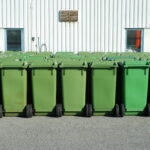Mass Live recently published an article on the opening of a new anaerobic digestion and depackaging facility in Granville. The facility, which is located on the family-owned Rockwood Farm and was developed by Ag-Grid Energy, will process enough food waste to generate 3.5 million kilowatt hours of electricity per year. The project received outside grant…
River Valley Co-op is a 17,000 square foot community-owned food cooperative in Northampton. In addition to traditional grocery items, the co-op has a prepared foods section, a self-service hot bar, and an extensive bulk section. Since their opening in 2008, River Valley Co-op has implemented a variety of waste diversion programs, including comprehensive recycling and…
The Massachusetts Department of Environmental Protection (MassDEP) has released the Draft 2020-2030 Solid Waste Master Plan. The plan proposes aggressive goals for waste reduction, building on the 18 percent reduction in disposal per capita achieved from 2008 to 2018. MassDEP has developed and implemented extensive programs since releasing the previous Solid Waste Master Plan in…
When your workplace hosts an event, the waste needs may be different from your day-to-day operations. With some planning, you can reduce waste and ensure that materials from your event are recycled. Events are also a good opportunity to collect food scraps for composting if your business does not do so already. RecyclingWorks in Massachusetts…
Stop & Shop is one of the largest supermarket chains in New England, operating over 400 stores across five states. Like other supermarkets, their stores generate a variety of recyclable and compostable materials, including cardboard, plastics, and food waste. As the company works towards a 50% reduction in wasted food by 2030, efforts have become…
After a year of preparation, food rescue organization Lovin’ Spoonfuls launched their first delivery in Hampden County last month. The Boston-based organization feeds hungry people by collecting surplus edible food from local businesses and institutions and delivering it to shelters, food pantries, and other groups that serve food-insecure populations across the state. Lovin’ Spoonfuls has…
The U.S. EPA Food Recovery Hierarchy ranks feeding hungry people near the top of its priorities as a strategy to reduce wasted food. In Massachusetts, the amount of rescued and donated food increased by over 20% between 2014 and 2017 as individual businesses and chains partnered with food rescue organizations across the state. Milford Daily…
Colleges and universities across Massachusetts continue to seek new strategies to recover wasted food. WWLP recently reported that Westfield State University has partnered with the Springfield organization Rachel’s Table to donate its excess food to families in need. Rachel’s Table, a program of the Jewish Federation of Western Massachusetts, facilitates the donation of food to…
The Vineyard Gazette recently published an article detailing an in-vessel compost project on Martha’s Vineyard. The new equipment will help the non-profit Island Grown Initiative (IGI) achieve its mission to reduce and redirect food waste on the Vineyard. Because of the limited disposal capacity on the Island, waste is regularly shipped back to mainland Massachusetts,…
Hampton Farms is a large nut producer and manufacturer operating a 130,000 square foot facility in Springfield with 42 full time staff. The company markets a variety of peanut products from raw in-shell peanuts to nut butters and is expanding its operations in nut processing. Hampton Farms is operating a recycling program for baled cardboard,…

